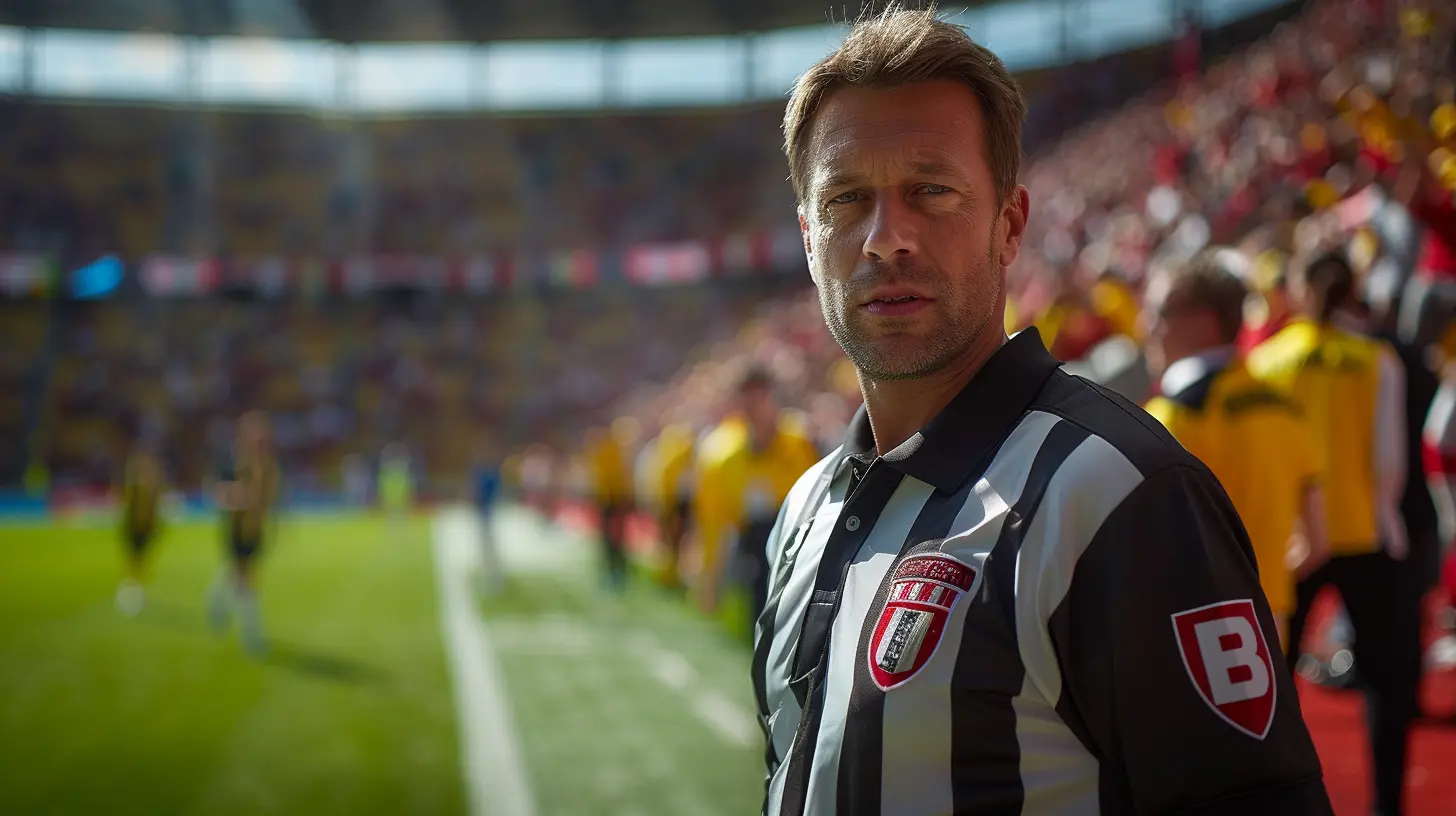Whistleblowers: How Referees Shape the Flow of the Game
28 June 2025
Let’s be honest — when we think of sports heroes, the first folks that pop into our heads are the ones dunking, scoring touchdowns, or hitting moonshot home runs. Nobody’s racing to buy a jersey with a whistle on it (although... hey, merch idea?). But here's the kicker — the folks with the whistles, our beloved (and sometimes booo-ed) referees, are the unsung puppeteers pulling the strings behind the scenes.
Yep, we're diving into the wonderfully complicated, occasionally controversial, often underappreciated world of referees. They're more than just walking zebras or people apparently out to ruin our favorite teams' chances. Refs actually shape the flow of the game, whether we like it or not — and trust me, there's more to it than just blowing whistles at random.
So grab your game snacks, slap on your foam finger (just maybe not at the ref), and let’s unpack the play-by-play influence of the real MVPs in stripes.
The Unsung Architects of Every Match
You ever sit back and wonder why a basketball game suddenly slows down or why a soccer match feels like it’s stuck in slow motion? That’s not just your stream lagging — that’s the referee working their magic (or mischief, depending on who you're rooting for).Referees are essentially the traffic cops of the sports world — except their job combines instant judgment calls, superhuman multitasking, and being screamed at by thousands of people without flinching. No pressure, right?
They don’t just enforce the rules. They interpret them, adapt to the energy of the game, mold the tempo, and manage the chaos. Think of them as DJs controlling the flow. If the game gets too aggressive? Blow the whistle. Too dull? Let a few close calls slide for a bit of spice. They're part game manager, part peacekeeper, part human punching bag.
The Whistle is Mightier than the Sword
If Shakespeare had been a sports fan, he’d probably have written odes to the power of the whistle.That small, shrill piece of plastic? It’s an authority grenade. A ref blows it, and instantly the entire game hits pause. It's like the sports equivalent of a TV remote — stop, rewind, and reset.
But what’s wild is how much power that whistle holds over rhythm. One foul call in basketball? Suddenly, everyone’s at the free-throw line, and the game crawls. No whistles in a hockey game? Now we’re watching a no-holds-barred rugby-on-ice brawl (delightful chaos). It’s all about the flow, baby.
A good ref knows when to let the game breathe and when to reel it in. It's a balancing act between control and chaos, and those who master it become invisible influencers of the game.
The Human Element: Judgment Calls and Gut Feelings
Referees, despite popular belief, are not robots (although, with VAR and replay systems creeping in, we’re getting closer). These are humans with instincts, split-second judgment skills, and yes — emotions.Don't believe me? Watch a ref decide whether to give a second yellow card in soccer. You'll see the brief pause, the internal struggle, the look that screams, “Do I really want to ruin this guy’s night?” They may not flinch, but believe me — they're feeling it.
That human touch is crucial. It adds texture and unpredictability. Sure, we love consistency in theory, but deep down, we enjoy the drama. The “Was that really a foul?” debates. The infamous “Tuck Rule” kind of controversies. Referees are part of the theater, and every call they make (or don’t make) changes the narrative.
Game Flow: The Invisible Influence
Let’s geek out a bit here. “Game flow” is basically the rhythm, pace, and general vibe of a match. It’s influenced by everything from team tactics to weather — but the ref? The ref is the drummer keeping time.In fast-paced sports like basketball and hockey, a trigger-happy ref can turn a thrilling back-and-forth game into a free-throw or penalty-fest. On the flip side, in football (yes, both American and global), a lenient ref might let the players duke it out like it's Gladiator 2.
They decide how tight or loose the game feels — how much physical contact is “too much,” how many tackles draw flags, and when to let advantage play continue. It’s like they’re holding the remote for sports mood lighting.
Ever noticed how some games just feel smoother than others? That’s not just the players bringing their A-game. A high-quality ref is like a great bartender — if they’re doing it right, you barely notice they’re there.
The Butterfly Effect of a Bad Call
Let’s not sugarcoat it — refs can mess things up. One bad call can flip a whole game on its head. Suddenly your team isn’t going to the playoffs because a guy in stripes blinked and missed an obvious offside.You know that feeling when your Wi-Fi drops at the worst moment on a Zoom call? That’s the sports fan equivalent of a blown call in double overtime. Agony. Despair. Rage. Dramatic Facebook statuses.
And yet, it’s part of the emotional rollercoaster. Refs might shape the game in a million subtle ways, but they also have the power to suddenly change its course with just one decision. A single whistle. A missed infraction. A flag thrown too soon.
The phrase “Don’t leave it in the hands of the judges” doesn’t just apply to boxing — sports fans know exactly how fragile the balance is when refs are at the helm.
The Rise of Tech: Is AI the Ref of the Future?
Let’s talk techno-whistles. With VAR (Video Assistant Referee), instant replay, Hawk-Eye, and all those other gadgets, we’re living in a world where Big Brother watches every offside toe and missed holding call.This can be both a blessing and a curse. Yes, we get more “accurate” decisions. But the flow? Chopped. Sliced. Diced. Watching a goal get celebrated, reviewed, disallowed, and then watching the fans deflate—feels like someone just unplugged the jukebox at a party.
There's an art to being a human ref that technology just can’t touch. Gut feel. Game sense. Context. You can’t program that into an algorithm — not yet, anyway. We still need someone in stripes to keep it all together. Although, a referee drone buzzing above the field? Slightly terrifying, slightly cool.
From Villains to Legends
Let’s be real. Most referees are only famous when they're hated. They’re easy scapegoats. Right or wrong, it’s always the ref’s fault when your team loses. That’s just sports law.But there are some who rise above. You’ve got the legendary ones with signature styles — the NBA refs who do dramatic hand swirls, the soccer refs with stone-cold stare-downs, the NFL refs who announce penalties like they’re giving a TED Talk. These refs become part of the experience.
They might not have fan clubs (or maybe they do — shoutout to Ref Appreciation Societies), but the great ones are remembered not just for their calls, but for how they handled pressure, kept order, and let the players shine.
Why Referees Deserve Some Applause (Or at Least Fewer Boos)
Here’s the truth: being a ref is one of the toughest gigs in sports. You're expected to be invisible until you mess up. You're under constant scrutiny. You need to memorize stacks of rules, stay in elite physical shape, and keep your cool when an entire stadium is howling at you.Imagine doing your job with 20,000 people watching and judging every keystroke (or in this case, whistle blow). Oh, and your mistakes are replayed endlessly on social media. Sound fun?
The next time you see a ref hustling down the court or calmly defusing a bench-clearing brawl, give ‘em a little mental nod. They’re out there doing a job none of us would willingly sign up for — and doing it while trying to keep the beautiful chaos of sports from turning into a full-blown circus.
Final Whistle: Let’s Give the Stripes Some Respect
So yeah, referees don’t dunk. They don’t score buzzer beaters or hit walk-offs. But they make that magic possible. They build the stage, enforce the script, and sometimes — intentionally or not — they add a plot twist nobody saw coming.Next time you’re yelling at your screen because of a questionable call, maybe — just maybe — take a breath and appreciate the art of the whistle. Behind every great game is a referee sweating, sprinting, and managing egos bigger than any playbook.
At the end of the day, refs shape the game not just with rules but with rhythm, attitude, and judgment. And while you probably won’t see their highlight reels on SportsCenter, you better believe they've got their fingerprints all over your favorite sports moments.
Referees: The flow-shapers we love to hate... and secretly respect.
all images in this post were generated using AI tools
Category:
RefereeingAuthor:

Umberto Flores
Discussion
rate this article
1 comments
Storm Wright
Referees play a crucial role in shaping the dynamics of sports. Their decisions can influence game momentum, highlighting the importance of fair officiating for a level playing field.
July 15, 2025 at 4:38 AM

Umberto Flores
Absolutely, fair officiating is vital for maintaining integrity and balance in sports, ensuring that the game flows smoothly and justly. Thank you for your insight!


